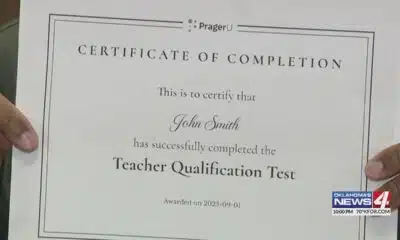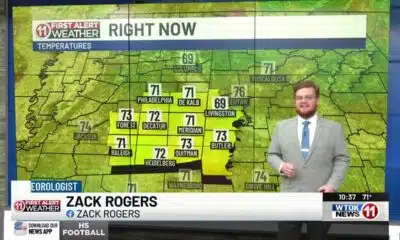News from the South - West Virginia News Feed
‘It will destroy this place:’ Tucker County residents fight for future against proposed data center
by Caity Coyne, West Virginia Watch
May 28, 2025
As a child, Nikki Forrester dreamed of living in a cabin in the woods surrounded by mountains, trees, water and the outdoor opportunities that came with the natural land. In 2022 — four years after earning her graduate degree and moving to Tucker County from Pittsburgh — Forrester and her partner made that dream a reality when they bought two acres of land near Davis, West Virginia to build a home.
Forrester has thrived in the small mountain town known for its mountain biking, hiking, stargazing, waterfalls and natural scenery. She and her partner moved into their new home in February. Hiking and biking trails are right outside her front door. In the winter, she said, snow piles up making the nearby mountains look like “heaven on Earth.”
It’s been quite literally a dream come true.
“I feel like I’ve never felt at home so much before. I love being in the woods. I love this community. It’s super cheesy, but this was my childhood dream and now it’s actually come true,” Forrester said. “It felt so good to set down roots here. We knew Davis was where we wanted to start our future.”
But in March, one small public notice posted in the Parsons Advocate — noticed by resident Pamela Moe, who scrambled to find answers after seeing it — changed Forrester’s assumptions about that future.
A Virginia-based company, Fundamental Data, was applying for an air permit from the West Virginia Department of Environmental Protection for what it called the “Ridgeline Facility.” The company’s heavily redacted application showed plans to build an off-the-grid natural gas power plant between Thomas and Davis. That power plant will likely be designed to power an enormous data center just a mile out from Tucker County’s most populous and tourist-attracting areas.
Earlier this month, representatives for Fundamental Data — who did not respond to requests for comment on this article — told the Wall Street Journal that the facility could be “among the largest data center campuses in the world,” spanning 10,000 acres across Tucker and Grant counties if fully realized.
Now, Forrester said, she and her neighbors are in the middle of what feels like a “fight for [their] lives” as they attempt to learn more about the vague development plans and fight against “big data.”
Her images of the future — skiing on white snow, hiking through waterfalls, looking up at clear and starry nights all with one-of-a-kind mountain scenery below — now exist in the shadows of a looming natural gas plant, an industrial complex and the contaminants that could come with them. The fresh, mountain air that surrounds her home and community could be infiltrated by tons of nitrogen oxide (gases that contribute to smog), carbon monoxide, particulate matter and other volatile organic compounds, per the company’s air permit application.
“Honestly, I feel like if this happens, it will destroy this place. People come here because it’s remote, it’s small, it’s surrounded by nature. If you have a giant power plant coughing up smoke and noise pollution and light pollution, it puts all of those things in jeopardy,” Forrester said. “It would honestly make me question whether I would want to live here anymore, because I do love the landscapes here so much, but they would be fundamentally altered and, I think, irreparably harmed if this actually comes to be.”
Tucker United and a fight against the many ‘unknowns’
Since learning of the project in March, Forrester and dozens of other Tucker County residents have banned together and formed Tucker United. The residents — all volunteers — want answers from Fundamental Data or anyone else regarding details of the proposed Ridgeline facility.
But that fight hasn’t been easy. The state DEP has allowed Fundamental Data — a company with little to no information publicly available — to submit a redacted air permit application, omitting details regarding potential air pollutants that could come from the site.
According to reporting in Country Roads News, local officials were unaware of the project before reporters and members of the public brought it to their attention.
Reading the Wall Street Journal article was the first time most residents were alerted about the potential size of the planned development.
Josh Nease, who lives outside of Thomas and Davis in an unincorporated part of Tucker County, said the unknowns about the project have been the most frustrating part to grapple with.
“There’s no lack of uncertainty right now, that’s for sure,” said Nease, a sixth generation West Virginian who moved to Tucker County after spending vacations there as a child growing up in Bridgeport. “I think the unknowns here are really worrying.”
If given the chance, he would want to ask representatives of Fundamental Data the following questions: Why the lack of transparency? Why does the company want to locate in Tucker County and why not further out from the towns? And why does it feel like there’s resistance against working with the local governments and community members?
Luanne McGovern, an engineer by trade who owns property in Tucker County and who sits on the board of West Virginia Highlands Conservancy, an environmental nonprofit in the region, holds similar frustrations to Nease.
Per the permit application, the Ridgeline facility — in its currently proposed form — would use gas-fueled turbines with heat recovery steam generators. Diesel would be kept on site in three 10 million gallon storage tanks as a backup power source in case of gas line interruptions. Those tanks would be 66 feet tall and 180 feet in diameter. Leaks from pumps and valves, among other pieces of equipment, are to be expected per the application. Operations for the facility should begin by 2028.
When residents started working together to make sense of Fundamental Data’s air permit application, they asked McGovern to look it over and share her thoughts. Having worked on similar permit requests before, she knew what she was looking at: A large, natural gas power plant.
What was more notable, however, was what she was unable to view.
Pollutants were listed on the request, but only in annual caps. There was no information on water usage despite some data centers using up to 5 million gallons of drinking water a day, straining resources in communities. While the heights of the diesel storage tanks were included, she said information on the turbines wasn’t.
While the DEP asked for clarification on Fundamental Data’s redactions following an influx of public comments from concerned residents, the company said it believed the omitted information met the state’s standard for confidentiality. The DEP ended up agreeing.
Fundamental Data, through its representative Casey Chapman, provided some details to the DEP in an attempt to put the public at ease: the site “does not plan” to use water from local water systems, rivers or streams and won’t discharge wastewater into them; mountains surrounding the development should “substantially limit” its visibility from populated areas and the facility “expects” to operate at noise levels that adhere with federal regulations.
But McGovern still had questions.
“Where is the water coming from? How high are these turbines? Where will they be? If we had some answers to these questions, we could do some modeling and figure out what the potential environmental impact would be, but we don’t,” McGovern said. “We’re just completely in the dark. There’s so many unanswered questions. As an engineer, there’s huge parts of this permit that are just bad. There’s no information provided, not even a level of standard of information that you would expect.”
Nease is realistic; he understands that these are complex issues and the state — as well as his region — are attempting to find new ways to bolster the economy and, hopefully, improve West Virginia’s economic standings long term.
He sees the challenges hitting Tucker County residents every day. There’s a housing shortage and short-term rentals are driving up costs for the places that do exist, pricing out residents who can’t afford to live where they work. While tourism can bring in crowds, it’s often only seasonal. The county’s population — like most of West Virginia — is declining.
“I fully understand the need to diversify the economy. I support doing that, we talk about it all the time. I guess I’m just not sure that a project like this is the solution,” Nease said. “We just don’t know enough about it. We don’t know if this is going to benefit the Tucker County economy. I sure hope it does, but all I have to rely on for that are vague statements.”
‘It feels extractive:’ West Virginia data centers to operate with no local oversight, questionable economic gains
On March 18 — the same day that Fundamental Data submitted its air permit application to the DEP — House Bill 2014 was introduced at the state Legislature to incentivize data centers to locate in West Virginia and generate their own power sources through microgrids. Senate President Randy Smith, a Republican who represents Tucker County and voted for HB 2014, did not respond to requests for comment on this article.
Despite being a key priority for Gov. Patrick Morrisey who requested its introduction, the bill was presented more than halfway through the state’s 60-day session. In back-and-forths over several weeks, lawmakers amended the bill again and again. One change removed a requirement for microgrids to use renewable energy sources, opening the door for coal and natural gas. Several other amendments changed the tax structure for any property taxes collected on the developments.
The version of the bill that now stands as law allows “high impact data centers” to curtail local zoning ordinances and other regulatory processes and establishes a certified microgrid program, which means data centers can produce and use their own power without attaching to already existing utilities.
The law creates a specialized tax structure for data centers and microgrids, which must be placed in designated districts. Local governments have little say or control over those districts, which are established at the state level.
Taxes collected on any data centers and microgrids operating in West Virginia would be split as so: 50% will go to the personal income tax reduction fund, 30% will go to the county where the data center is located, 10% will go to the remaining 54 counties split on a per capita basis using the most recent U.S. Census, 5% will be placed in the Economic Enhancement Grant Fund administered by the Water Development Authority and the final 5% will be put in the newly created Electric Grid Stabilization and Security Fund.
Initially, those taxes were going to be completely diverted away from localities where the data centers would be located, angering county commissioners and other local leaders from throughout the state.
Kelly Allen, executive director of the West Virginia Center on Budget and Policy, said the fact that 50% of any tax revenue collected going to offset the state’s personal income tax cuts is a concern, especially while only 30% will return to localities that host the data centers.
“Local governments are really limited in the ways that they can raise revenue, which is largely controlled by either the state constitution or the state legislature. So taking away a significant slice of one of the only ways that they can raise revenue — through property taxes — leaves [localities] with fewer options to fund basic services,” Allen said. “At the same time, these data centers and micro grids are probably going to increase the need for the public services that local governments pay for.”
Allen pointed to the potential risks that come with operating power plants: county fire and police services will be needed for safety at the plants and water districts may be impacted, she said.
Essentially, she said, counties will be on the hook for funding more services while only receiving a fraction of the revenue generated by the sources of those costs.
And, generally, there’s no guarantee — despite Fundamental Data’s claims for the Tucker County facility — that data centers will serve as massive employers.
Nationwide, according to the U.S. Census, jobs in data centers are increasing. But more than 40% of all jobs in 2023 existed in just three states. Per an analysis by Business Insider, most of the data center jobs available are only in construction and contracted from outside the places the centers are located.
Data centers are largely automated. Microsoft, for example, employs just 50 people per a facility. In West Virginia — because of the inclusion of microgrids, which aren’t mandated to be created for data centers — the picture could look different. But again, the lack of details from companies coming here makes the real impact difficult if not impossible to determine.
Allen said she’s wary of the state’s potential reliance on data centers for a financial boom given the state’s history of extraction-based economics.
Like with the coal economy, residents across the state will bear the aesthetic, environmental and health costs associated with living near data centers and their power plants. Most of the profits, however, may not return to them, Allen said.
“It’s not exactly identical to coal or natural gas or timber, but it feels extractive in the same way in that the benefits of the data center are borne by people outside of West Virginia, while the costs are borne by our residents,” Allen said.
Nease said that while he wants to be “pragmatic” about the potential for development in Tucker County, he can’t help but think of the state’s history in that regard either.
“I’m worried we’re going to fall into that same trap again. It’s an age old story — not just for West Virginia. Some people are going to benefit from this project, they just might not be here,” Nease said. “The company will benefit, its [shareholders] will. But will we?”
‘A race to the bottom:’ While West Virginia lawmakers want to compete with Virginia, locals say it’s not possible
While state lawmakers spent hours this legislative session debating how to craft the state’s new law to attract data centers, several couldn’t stop thinking about — or mentioning — neighboring Virginia, where the development of large, high-impact data centers have boomed.
Echoing sentiments shared by Morrisey through his “Backyard Brawl” plan to compete with neighboring states economically, delegates — including Del. Clay Riley, R-Harrison, who sits on the House Committee on Energy and Public Works, where the bill passed — said they wanted to see data center development here thrive like it has in Northern Virginia.
Loudoun County, Virginia has been dubbed “Data Center Alley.” It’s home to the largest data center market in the world.
But that development didn’t happen overnight, said Julie Bolthouse, director of land use at Piedmont Environmental Council in Virginia.
The industry started building in Northern Virginia in the 1990s and 2000s. Some of the largest data and internet providers at the time were located there. Over time, though, the market has changed.
Bolthouse said what used to be small complexes organized like business parks — featuring restaurants, shopping, day cares and more for people who lived in the region — are now large campuses with few people, no outside amenities and mostly computers and software.
And those “hyper-scaled” complexes — in Virginia and beyond — haven’t come without costs. The pollutants emitted by large centers are known to exacerbate respiratory problems and other health conditions. Residents nearby can hear the incessant buzzing and hums of the computers and generators at work. Light pollution, depending on the size and type of facility, can be impossible to ignore.
But these issues — outside of the environmental ones — vary place to place because of local ordinances.
“That is like the only thing that’s really protecting Virginia communities, because the only way that the people who live in these localities are able to get any kind of protection is because of noise ordinances, because of the lighting ordinances,” Bolthouse said.
In West Virginia under HB 2014, residents won’t have the same protections or powers due to the state’s superseding of local ordinances.
And now, decades into Virginia’s ever changing data center sector, Bolthouse and other environmentalists are seeking more regulations on the state level since the nature of these data centers has changed so much over such a short period of time.
“That’s the push we’re seeing now — for the state to come in and add additional regulations, to look at the environmental impact,” Bolthouse said. “No one is talking about taking away the ability of localities to regulate these facilities. I can’t imagine that.”
And while the landscape for data centers is evolving in Loudoun County and beyond, the reason so many large companies have decided to locate their centers in Northern Virginia goes back to the 1990s. The infrastructure for them to be developed, Bolthouse said, already existed — it wasn’t newly created like West Virginia is attempting to do.
“There’s such a robust fiber network here. These data centers are kind of like a gigantic global computer. They talk to each other, and so the closer they are to all the other cloud providers, the better,” Bolthouse said. “When you put a data center here, your data is stored in Northern Virginia and you are in spitting distance to [Amazon], Google, Microsoft, all the big co-locators … probably every big business has an operation here in Northern Virginia. So it’s like the Wall Street of the data center industry. That’s why they want to locate here.”
Bolthouse warned that without regulations, without protections and without the advantages that Virginia has through its location and infrastructure, West Virginia could be attempting to enter a new sector by inviting in the “worst players.”
“What you’re going to get if you do it this way is the worst players, the ones that didn’t need to be in Northern Virginia … the players that are wanting that lack of regulations because they didn’t want to abide by rules and didn’t want to or need to protect communities, which is worse for West Virginia and the communities,” Bolthouse said. “What West Virginia is doing is not what Virginia is doing.”
She said West Virginia needs to look at the assets it already has, not the assets others in the sector have worked with for decades.
Those assets, in Bolthouse’s words, are the same things that made Forrester feel like her childhood dreams were coming true when she built a home in Tucker County: the state’s “beautiful mountains, its rivers, its natural beauty and outdoor opportunities.”
“That’s what West Virginia should be leveraging. The state shouldn’t be trying to get something that another state has already secured the market on,” Bolthouse said. “I don’t know that West Virginia can become the next Data Center Alley. I don’t think that’s actually feasible … You’re trying to basically have a race to the bottom, and you’re only going to get the worst players.”
YOU MAKE OUR WORK POSSIBLE.
West Virginia Watch is part of States Newsroom, a nonprofit news network supported by grants and a coalition of donors as a 501c(3) public charity. West Virginia Watch maintains editorial independence. Contact Editor Leann Ray for questions: info@westvirginiawatch.com.
The post ‘It will destroy this place:’ Tucker County residents fight for future against proposed data center appeared first on westvirginiawatch.com
Note: The following A.I. based commentary is not part of the original article, reproduced above, but is offered in the hopes that it will promote greater media literacy and critical thinking, by making any potential bias more visible to the reader –Staff Editor.
Political Bias Rating: Center-Left
This article presents a critical view of the data center industry’s expansion in West Virginia, focusing on environmental, economic, and community concerns that align with progressive priorities such as environmental protection and local governance. It highlights potential negative impacts on rural communities, transparency issues, and the limits of state incentives favoring large corporations over local interests. While it acknowledges economic development needs, the tone and framing emphasize skepticism about deregulation and extractive economics, which typically resonate with a center-left perspective advocating stronger environmental oversight and equitable economic benefits. The article maintains factual reporting but leans toward critiquing policies favoring corporate interests at the expense of local communities.
News from the South - West Virginia News Feed
National Grandparents Day (9-7-25) and the special bond shared with their grandchildren
SUMMARY: This Sunday, September 7th, is National Grandparents Day, honoring the special bond between grandparents and grandchildren. In Milton State, many grandparents become primary caregivers due to their children’s substance abuse disorders. Presley Ridge highlights the vital role grandparents play in foster care, offering training and support to become certified foster parents. West Virginia leads the nation in child removals, resulting in many grandparents raising grandchildren full-time. Services aim to reunify families by supporting parents’ recovery. Children thrive better in familiar grandparent homes, providing love and stability. Senator Brian Hilton emphasizes improving treatment programs to help families heal and support grandparents effectively.
National Grandparents Day is a time to appreciate the joy and wisdom they bring to our lives. Mountain State grandparents often take on another role, stepping in to become primary caregivers when their children have substance abuse issues.
~ Newswatch reporter Jillian Risberg (https://www.facebook.com/JillianRisTV) found out how much love, guidance, and stability grandparents can provide.
FOLLOW US ON FACEBOOK AND TWITTER:
https://facebook.com/WOAYNewsWatch
https://twitter.com/WOAYNewsWatch
News from the South - West Virginia News Feed
WV Supreme Court will hear BOE’s appeal in vaccine lawsuit — but not right away
by Lori Kersey, West Virginia Watch
September 5, 2025
West Virginia’s highest court will take on a legal battle over the state’s school vaccination requirements, but it denied a request by state school officials that it do so quickly.
The state Supreme Court on Thursday set a deadline of Dec. 12 for the West Virginia Board of Education to prepare its appeal of a Raleigh County judge’s July ruling against it. That ruling was in regards to a lawsuit brought by three Raleigh County families over the board’s refusal to accept religious exemptions to the state’s mandatory school vaccine requirements.
Raleigh County Circuit Judge Michael Froble in July granted a preliminary injunction in the case that allows students in the case to attend class with a religious exemption to the vaccination requirements.
The school board had filed notice of appeal and asked the high court to both expedite a review of the appeal and temporarily halt the proceedings in the lower court.
In the scheduling order Thursday, the court denied both motions. Justices also set a deadline of Jan. 26 for the plaintiffs in the case to respond to the board’s appeal. The board will then have until Feb. 16, 2026 to write a reply, if necessary.
After the Feb. 16 reply brief deadline, the court writes, the appeal will be ready for review.
The Raleigh lawsuit is one case in a legal battle over religious freedom and the state’s strict school vaccination requirements. Every state requires school students to be vaccinated against a number of infectious diseases including polio, chicken pox and measles. Florida officials announced this week plans to eliminate its vaccine mandates.
West Virginia has been one of only five states that have not allowed students to opt out of the shots because of their religious or philosophical objections to them.
West Virginia Gov. Patrick Morrisey issued an executive order on his second day in office requiring the state to allow religious exemptions. His order is based on the 2023 Equal Protection for Religion Act. He argues that the religious freedom law, when read alongside the vaccination law, calls for the religious exemptions.
Morrisey has not rescinded that executive order, even though the state Legislature earlier this year rejected a bill that would have established those religious exemptions in state code.
Raleigh County Circuit Judge Michael Froble has scheduled a two-day hearing next week on a permanent injunction in the lawsuit, which he recently consolidated with a lawsuit brought against the state health department by two parents of immunocompromised students over its issuance of religious exemptions. Plaintiffs in that case are represented by the ACLU of West Virginia and Mountain State Justice.
The hearing is set for Sept. 10 and 11 at the Raleigh County Judicial Center. During that hearing, the judge has said he wants to consider issues that include whether the state’s vaccination law is constitutional without religious exemptions and the authority of Morrisey’s executive order.
YOU MAKE OUR WORK POSSIBLE.
West Virginia Watch is part of States Newsroom, a nonprofit news network supported by grants and a coalition of donors as a 501c(3) public charity. West Virginia Watch maintains editorial independence. Contact Editor Leann Ray for questions: info@westvirginiawatch.com.
The post WV Supreme Court will hear BOE’s appeal in vaccine lawsuit — but not right away appeared first on westvirginiawatch.com
Note: The following A.I. based commentary is not part of the original article, reproduced above, but is offered in the hopes that it will promote greater media literacy and critical thinking, by making any potential bias more visible to the reader –Staff Editor.
Political Bias Rating: Centrist
The content presents a factual and balanced overview of the legal dispute surrounding vaccine exemptions in West Virginia without evident partisan language or framing. It reports on actions taken by government officials, court decisions, and ongoing lawsuits from multiple perspectives, including those of the state board, families, and advocacy groups. The neutral tone and focus on legal developments suggest a centrist approach, aiming to inform rather than persuade toward a particular political viewpoint.
News from the South - West Virginia News Feed
Christian’s Morning Forecast: Strong to Severe Storms Incoming
SUMMARY: Storm Watch meteorologist Christian Boler reports strong to severe storms approaching West Virginia, especially McDow, Tazewell, and Wyoming counties during the morning commute. Temperatures will remain in the upper 60s to low 70s with southwest winds around 5-10 mph. A marginal severe weather threat exists across the region, mainly involving winds and flooding, but no tornadoes or hail expected. Rainfall of a quarter to half an inch is likely over 48 hours with isolated downpours. Storms will arrive in two waves before clearing Friday. Another front may bring showers Saturday, but high pressure will clear skies for the weekend and beyond.
FOLLOW US ON FACEBOOK AND TWITTER:
https://facebook.com/WOAYNewsWatch
https://twitter.com/WOAYNewsWatch
-
News from the South - Louisiana News Feed7 days ago
‘They broke us down’: New Orleans teachers, fired after Katrina, reflect on lives upended
-
Mississippi Today6 days ago
Trump proposed getting rid of FEMA, but his review council seems focused on reforming the agency
-
News from the South - Tennessee News Feed6 days ago
Tennessee ranks near the top for ICE arrests
-
News from the South - Missouri News Feed6 days ago
Missouri joins dozens of states in eliminating ‘luxury’ tax on diapers, period products
-
News from the South - Texas News Feed3 days ago
Texas high school football scores for Thursday, Sept. 4
-
News from the South - Arkansas News Feed6 days ago
Every fall there’s a government shutdown warning. This time it could happen.
-
News from the South - Oklahoma News Feed6 days ago
Test taker finds it's impossible to fail 'woke' teacher assessment
-
Mississippi News Video7 days ago
WTOK Weather – Zack Rogers 8/30/25








































